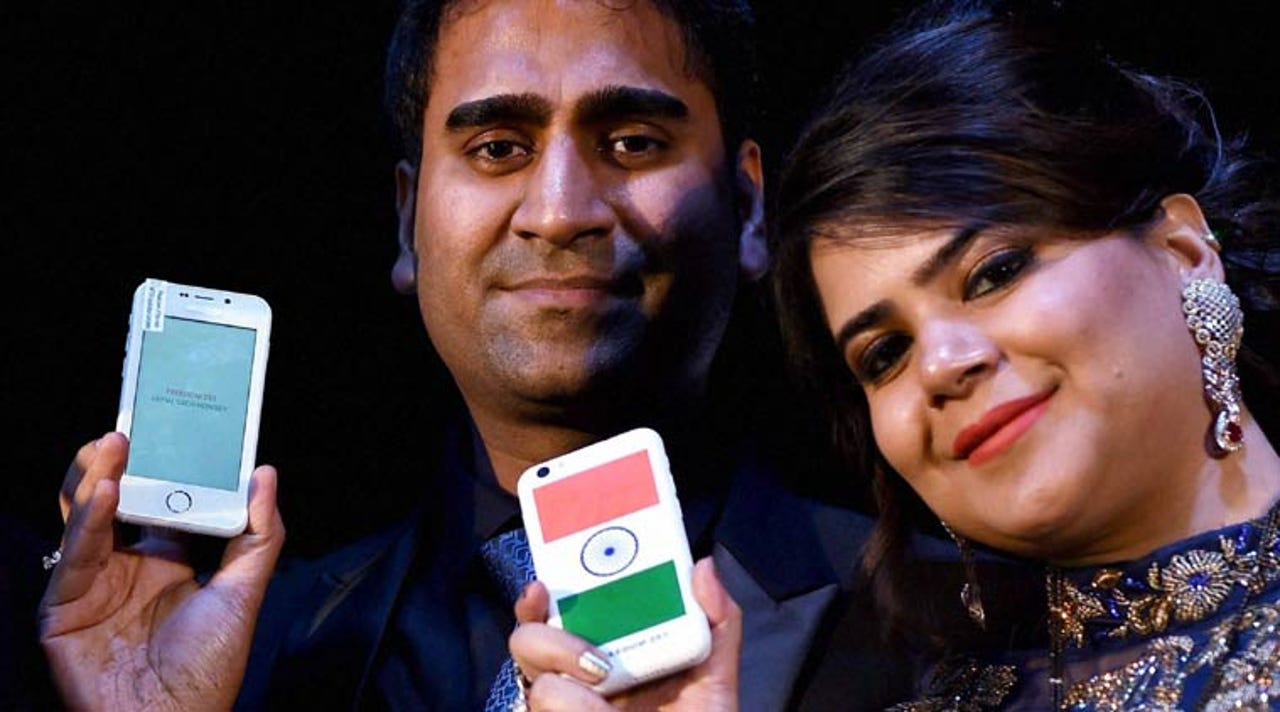Is this $4 smartphone too good to be true?


The way to sell a $4 smartphone in India goes as follows: buy a Chinese smartphone for around $60-$70. Crudely paint over the Chinese brand, or affix sticker over name. Invite a top official from the government to inaugurate said phone in much -trumpeted launch. Voila.
Or at least this is how it appears that a company named Ringing Bells that no one knew about a few days ago has suddenly catapulted itself into the limelight via its 'Freedom 251' phone--orders for which came in at a purported (company-reported) '600,000 hits a second,' crashing its website. All anyone really knows about Ringing Bells is that it is owned by one Mohit Kumar Goel who seems to have made his money in the agricultural business. The phone was launched at an event in a Delhi park that apparently could have easily been mistaken for a gaudy wedding.
Does the phone really cost $4? For the price of a bone you give your dog to chew on, the Freedom 251 packs in a 4-inch screen (type unknown), 1.3 GHz quadcore processor, 1GB of RAM, 8GB of storage, a 3.2-megapixel rear camera, a 0.3-megapixel front camera and a 1,450mAh battery and runs Android 5.1.
In short, the answer is a resounding 'No.' "It looks like it's highly subsidized by the company and it's not clear how they plan to sustain this," said Tarun Pathak an analyst with Counterpoint Technology Research in a Reuters article. Ironically, the phone bears an uncanny resemblance to a product from the purveyor of the world's most premium phones--ie, the Apple iphone 4. All resemblances fade away astonishingly quickly when you notice the brand 'Adcom' hastily smudged out with white paint.
According to this article, Adcom is an importer of tech products based out of Delhi but which professes no knowledge or link to the Freedom 251 phone. Yet, its Ikon 4 handset which costs Rs 4,000 ($60) on Flipkart bares uncanny resemblance to the 251.
If all of this adds up, Ringing Bells seems to have boldly introduced the notion of a 'loss leader' to the handset market which others have been heretofore loath to do. In other words, flog said phone for way cheaper in order to grab market share since the phone, according to a wide number of industry hands quizzed by the media, costs at least eight times what Ringing Bells is pricing it at (a sum that also neatly matches the price of the Ikon 4.)
"This pricing is not possible under any circumstances, even if the components are made in India," complained Indian Cellular Association president Pankaj Mohindroo who has urged the government to look carefully into this proposition--probably a futile suggestion considering prominent members of the ruling nationalist BJP party were present at the launch.
Yet, all of this hand-wringing over pricing may not deter the hundreds of millions in the Indian hinterland who are still using feature phones and are waiting to make the leap into the world of smartphones. India is currently the fastest growing market for smartphones with an existing, low penetration rate of 30 percent. At least 700 million people in the country will buy smartphones in the next ten years making it the most mouth-watering market in the world for phone buyers.
Still, it is worth asking, how does the Freedom 251 attain a freedom from basic economics of? Company President Ashok Chadha says that he expects to make the phone possible through "economies of scale," tax breaks for local manufacturing, and other cost-cutting measures. "We are technocrats and have some understanding of international economics," he said in a WSJ blog piece.
Seeing is believing.